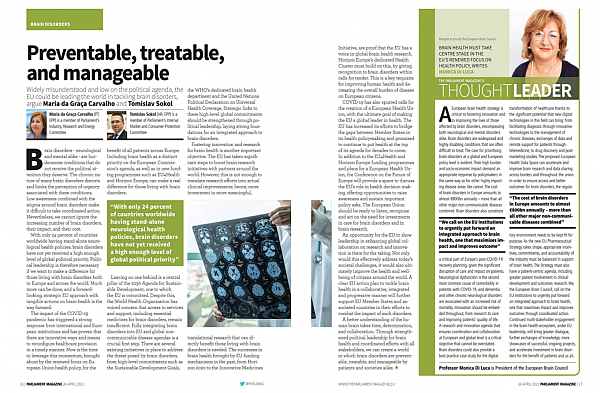Imprensa Brain disorders: Preventable, treatable, and manageable
Brain disorders - neurological and mental alike - are burdensome conditions that do not receive the political attention they deserve. The chronic nature of many brain disorders distorts and limits the perception of urgency associated with these conditions. Low awareness combined with the stigma around brain disorders make it difficult to take coordinated action. Nevertheless, we cannot ignore the increasing number of brain disorders, their impact, and their cost.
With only 24 percent of countries worldwide having stand-alone neurological health policies, brain disorders have not yet received a high enough level of global political priority. Political leadership is therefore necessary if we want to make a difference for those living with brain disorders both in Europe and across the world. Much more can be done, and a forward-looking, strategic EU approach with tangible actions on brain health is the way forward.
The impact of the COVID-19 pandemic has triggered a strong response from international and European institutions and has proven that there are innovative ways and means to reconfigure healthcare provision in a timely manner.
Now is the time to leverage this momentum, brought about by the renewed focus on European Union health policy, for the benefit of all patients across Europe. Including brain health as a distinct priority on the European Commission’s agenda, as well as in new funding programmes such as EU4Health and Horizon Europe, can make a real difference for those living with brain disorders.
Leaving no one behind is a central pillar of the 2030 Agenda for Sustainable Development, one to which the EU is committed. Despite this, the World Health Organization has voiced concern that access to services and support, including essential medicines for brain disorders, remain insufficient. Fully integrating brain disorders into EU and global non-communicable disease agendas is a crucial first step.
There are several existing initiatives in place to address the threat posed by brain disorders, from high-level commitments such as the Sustainable Development Goals, the WHO’s dedicated brain health department and the United Nations Political Declaration on Universal Health Coverage.
Strategic links to these high-level global commitments should be strengthened through political leadership, laying strong foundations for an integrated approach to brain disorders.
Fostering innovation and research for brain health is another important objective. The EU has taken significant steps to boost brain research initiatives with partners around the world. However, this is not enough to translate research efforts into actual clinical improvements; hence, more investment in more meaningful, translational research that can directly benefit those living with brain disorders is needed.
The successes in brain health brought by EU funding mechanisms in the past, from Horizon 2020 to the Innovative Medicines Initiative, are proof that the EU has a voice in global brain health research. Horizon Europe’s dedicated Health Cluster must build on this, by giving recognition to brain disorders within calls for tender. This is a key requisite for improving human health and decreasing the overall burden of disease on European citizens.
COVID-19 has also spurred calls for the creation of a European Health Union, with the ultimate goal of making the EU a global leader in health. The EU has increased its efforts to bridge the gaps between Member States in its health policymaking and promised to continue to put health at the top of its agenda for decades to come.
In addition to the EU4Health and Horizon Europe funding programmes and plans for a European Health Union, the Conference on the Future of Europe will provide a space to discuss the EU’s role in health decision making, offering opportunities to raise awareness and sustain important policy asks. The European Union should be ready to listen, recognise and act on the need for investments in care for brain disorders and in brain research.
An opportunity for the EU to show leadership in enhancing global collaboration on research and innovation is there for the taking. Not only would this effectively address today’s societal challenges, it would also ultimately improve the health and well-being of citizens around the world.
A clear EU action plan to tackle brain health in a collaborative, integrated and progressive manner will further support EU Member States and associated countries in their efforts to combat the impact of such disorders.
A better understanding of the human brain takes time, determination, and collaboration. Through strengthened political leadership for brain health and coordinated efforts with all stakeholders, we can create a world in which brain disorders are preventable, treatable, and manageable by patients and societies alike.
Maria da Graça Carvalho, member of Parliament’s Industry, Research and Energy Committee
&
Tomislav Sokol, member of Parliament’s Internal Market and Consumer Protection Committee
